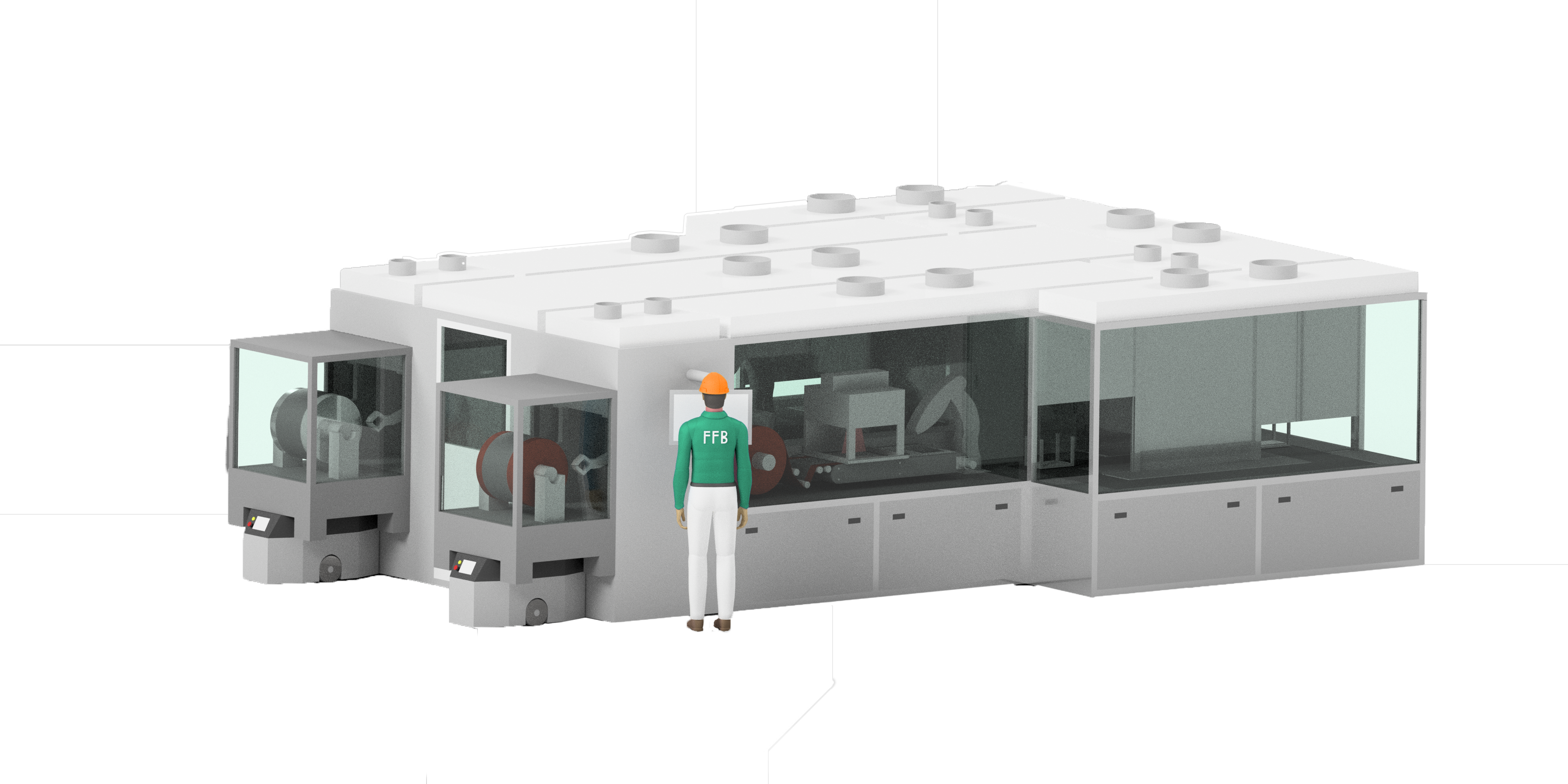Pioneering concepts for sustainable and economical battery cell production
Münster. High-performance battery cells are a key prerequisite for the transition to sustainable mobility. To achieve this, it is essential to create a more energy-saving and resource-efficient production infrastructure for the cells. Researchers at the Fraunhofer Research Institution for Battery Cell Production FFB are now demonstrating ways in which the use of so-called »mini- and macro-environments« can reduce energy and operating costs in battery cell production, thereby creating high potential for competitive battery production in Germany and Europe. The findings are summarized in the newly published whitepaper »Energy-efficient and quality-oriented plant concepts for battery cell production«, which is now available.
The momentum with which battery storage technology is developing as one of the most promising approaches to substituting fossil fuels is enormous. However, in order for battery cells to be manufactured more sustainably and economically in the long term, additional savings potential and efficiency strategies are required in the manufacturing process, without disregarding the standards of manufacturing environments. The whitepaper by the Münster researchers describes how economic and environmental savings potential can be achieved in battery cell production in the future with the help of various innovative environment concepts, and also shows the practical implementation of the concept at Fraunhofer FFB.
Challenges in battery cell production
In its field of application, the lithium-ion battery (LIB) is considered the most advanced variant: stationary energy storage systems, consumer electronics, but above all the electrification of mobility takes up the bulk of the expected total demand. It is the driver for the annually increasing demand for LIB in the gigawatt hour range.
The growing demands on the sustainability and performance characteristics of the battery, such as higher energy density to increase the range of electric vehicles, also require new types of cell materials. However, with a view to smooth, high-quality and safe production of the battery cells, these place extensive demands on cleanliness and dryness. Clean and dry rooms, i.e. hermetically sealed rooms, meet these requirements. They have a dry room climate and thus very low humidity at a dew point of minus 60 degrees - the temperature value at which condensation of the air humidity begins. To make it drier than in the desert, however, enormous amounts of energy are required to process the very dry air.
Potential of new environment concepts in battery cell production
For the manufacturing environment, Fraunhofer FFB is therefore developing, implementing and researching process- and machine-related enclosure concepts in production, which are intended to replace the energy-intensive clean and dry rooms in the future and represent significantly more cost-effective and sustainable alternatives.
- »Mini environments are limited, separated manufacturing and transport units that encapsulate the value-adding process as well as the product. The use of mini-environments is still limited to laboratory or pilot scale.«
- »Macro environments connect and combine limited, segregated manufacturing areas, which can include operations, logistics, also machine and manufacturing units.«
Marius Heller, research associate in the »Assembly and Formation« research group at Fraunhofer FFB, says: »The use of 'mini-environments' in battery cell production can improve crucial parameters. These include significantly lower operating and energy costs and the protection of employees from potentially harmful hazardous substances. For the industry, a switch to environment plant concepts in the future can bring about a turnaround to ecological and economical cell production in Europe.«
Implementation and testing in the production lines of Fraunhofer FFB
In the future, plant manufacturers will be required to design effective and efficient plant technology. In its flexible and adaptable factories, the »FFB PreFab« and »FFB Fab«, Fraunhofer FFB will establish a benchmark for quality-oriented and energy-efficient plant technology compared to the existing state of the art and thus make a significant contribution to the transfer of advanced solutions to the battery industry. To this end, among other things, the surrounding clean and dry rooms will be held in order to test and quantify the process and production technologies. At the same time, the testing of the environment concepts will be carried out step by step.
Hasibe Turhan, research associate in the »Assembly and Formation« research group at Fraunhofer FFB: »We expect battery cell production to undergo a similar development to that which semiconductor production already underwent 30 years ago: By encapsulating close to the process, targeted air flows can be realized and a high product quality can be achieved. Overall, the entire process environment will be optimized.«
Based on market observations and industry discussions, Fraunhofer FFB expects the breakthrough for »mini-environments« from the pilot line scale to the series scale starting in 2027.
The whitepaper »Energy-efficient and quality-oriented plant concepts for battery cell production« is now available for free download (in german only):
Last modified:
